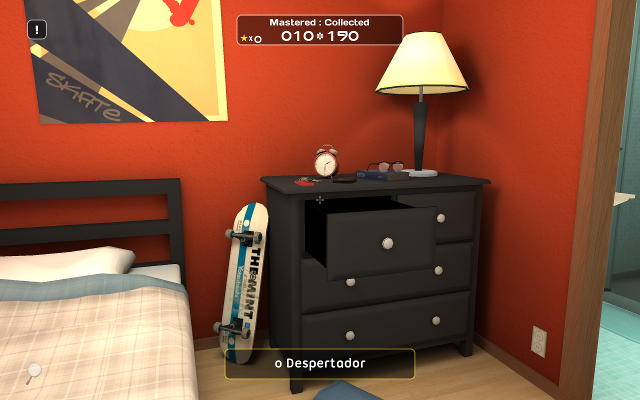Influent Review: Learn a New Language Inside a 3D Dictionary
What is Influent?
Influent is a video game that helps you pick up vocabulary in a new language while exploring a 3D world.
- what it’s for:
- Vocab building while having fun
- languages:
- Spanish, French, German, Korean, Japanese, Italian, Mandarin Chinese, Russian English, Brazilian Portuguese, European Portuguese, Danish, Norwegian, Finnish, Swedish, Bulgarian, Hindi, Latin
- level:
- Upper Beginner - Lower Intermediate
+ PROS
- Learn over 400 words in a real world context
- An innovative approach to learning with lots of potential
- Feels like a 3D dictionary
- Available for Windows, Mac and Linux
- Visually appealing with cute graphics
- CONS
- Best with languages you already know a little
- Controls are clunky
- Lack of in-game instructions
- Mistakes and typos
Kids these days don’t know how good they have it. When I was a child studying French in school, the most advanced language-learning technology available was an audio cassette player. These days we have Skype, Anki, and a zillion other apps and gadgets that make learning a new language easier than ever.
One such app is Influent, an indie videogame that can help you learn vocabulary. It’s currently available for over 15 languages, and they’re planning to add even more languages soon.
So how does Influent work, and is it any good?
What is Influent?
The idea of Influent is simple: you walk around a virtual apartment full of common household items, and click on each item to learn its name in your target language. Every word that you discover is saved to a list for reference; later on, you can test your memory against this list.
Influent is available for Mac, Windows, and Linux, and can be purchased from Steam. At the time of writing, there are versions in 18 languages: English, French, German, Spanish, Brazilian Portuguese, European Portuguese, Italian, Danish, Norwegian, Finnish, Swedish, Japanese, Mandarin, Korean, Russian, Bulgarian, Hindi, and even Latin. The first language will cost you $9.99 (£7.99 on UK Steam); extra languages are available as expansion packs for $4.99 (£3.99).
Textbooks are boring; instead of learning new words from a list on the page, Influent can “show” you those words in a (sort of) real-world context. Hopefully, the extra stimulation will make it easier to remember the vocabulary – and also be more fun!
Learn 420 New Words in a Game?
It may be a bit generous to call Influent a “game”. There’s no progression, no story, and no real objective except “learn these words”. The original Kickstarter campaign describes the app as a “3D Dictionary”, which may be a better label.
Influent isn't, and doesn't claim to be, a comprehensive language-learning solution. It won't improve your speaking skills or grammar; at best, it's an interesting and novel way to learn 420 new words for the kind of everyday items you might have around your house – words like “bed” or “scissors”.
How I Tried Out Influent
To try the game out, I opted for Russian, a language that I don’t speak at all. I quickly realised that this was a bad choice – learning random words like “fridge” and “lightswitch” is a terrible way to start a new language – so I switched to Brazilian Portuguese. I already speak Portuguese reasonably well, but I figured that Influent would be an interesting way to plug the holes in my vocabulary, of which there are many.
Welcome to the Apartment of Andrew Cross
The game starts with an animated introduction in which we meet the protagonist, Andrew Cross.
Cross is the inventor of the “SanjigenJiten”, a high-tech gadget that can tell you the name of any object in a foreign language. Unfortunately, someone stole Cross’s designs, so now he’s running a campaign on “Firestarter” in order to… I'm not sure. The introduction makes no sense, but it doesn’t matter, as it’s the last you’ll hear of the game’s confusing “story”.
Anyway, you now control Andrew, and can move around his apartment scanning objects with the SanjigenJiten.
The building is small, but there’s a lot of detail, i.e. a lot of words to learn. Every drawer and cupboard can be opened to discover new objects (and thus new vocabulary) inside.
It’s clear that the game’s designers have made a lot of effort to include everything that you would expect to find in your own apartment…well, at least if you’re male. Cross lives alone and apparently is single, so Influent won’t teach you words like “skirt” or “makeup”.
You can click on an object to see and hear its name, then press Space to add the new word to your Vocab list.
Test Yourself on the Vocab You’ve Learned
When you get bored of finding new items, you can play a simple game called “Time Attack” to test yourself on the words you’ve already discovered. Words flash on your screen, and you have to remember what they mean and find the object in question within the apartment. Get a word right three times in a row, and it will be considered “mastered”.
This will only teach you nouns, but Influent also includes some common adjectives and verbs, each of which is associated with a particular item in the house.
By mastering words, and completing other simple challenges, you earn “stars” which can be spent to discover these extra words. For example, while inspecting a book with the SanjigenJiten, you can spend your hard-earned stars to learn the words for “read” and “interesting”.
What About Different Writing Systems?
One thing I did notice in the Russian version of Influent is that it has the option to switch between the Cyrillic and Latin alphabets when learning words. So if your target language uses a different writing system, you should be covered whether or not you can read that system yet.
Is Influent Suitable for Beginners?
Influent’s vocabulary list isn’t suitable for absolute beginners, but it’s still fairly basic.
Here’s a quick test: if you’re at home, look around the room and ask yourself how many of the items you see can you name in your target language. Can you say “window”, “wall”, “table”, “chair”, or “light”? What about “pen”, “headphones”, “shoes”, and “guitar”, or the different types of food in your fridge and toiletries in your bathroom?
Influent is best suited for learners in the “upper beginner” or “lower intermediate” stages of their language-learning journey. That’s when these kinds of words make the most sense to learn.
What’s Not so Great About Influent?
Influent’s graphics are cute, cartoony, and visually appealing. Unfortunately, other aspects of the game aren’t nearly as well-designed. The controls are clunky and cumbersome; moving Andrew around his apartment never felt like a smooth experience, especially in third-person mode (you can switch between a first- and third-person viewpoint).
Another frustration for me was the lack of good in-game instructions. At the start, you’re given a brief explanation of the controls and main game mechanics, but it’s not enough. For example, the first time I played Time Attack, it didn’t seem to work; I’d found the correct object and was clicking on it, but nothing was happening. That was before I realised I had to double-click on the object in question, which hadn’t been made clear at all. A minor annoyance, yes, but there were many more like it.
More worryingly, I found several mistakes in Influent’s Brazilian Portuguese version. After spotting a few questionable translations that aroused my suspicion, I recruited my wife, who is Brazilian, to cast an expert eye on the game. Within just a few minutes of playing together, we’d found an alarming amount of errors.
These ranged from minor typos (auto-falante instead of alto-falante, barinjela instead of berinjela) to outright mistranslations: “toilet” is given as banheiro, but that word means “bathroom”; it should be privada. “Chopstick” is given as palito, but Brazilians actually use the Japanese loanword hashi.
Other mistakes were more subtle. For example, “videogame console” is given as console, and this isn’t strictly wrong, but my wife assures me that no-one in Brazil ever really says this. A much better translation is videogame, pronounced “vee-jee-yo-GAY-mee” (confusingly, Brazilians use the English word “videogame” to refer to the console itself, not the games that you play on it).
Those are just a few of the issues we noticed in a very brief review of Influent’s vocabulary list. Of course, most other words were fine – but even one mistake is too many. If I spot sloppy mistakes like this in the words I know, how can I trust Influent’s translations of the words I don’t yet know?
Verdict: Flawed, Fun and Engaging — with Limitless Possibilities
Influent is not available in Polish, but what it really lacks is polish.
With that being said, its flaws aren’t fatal. If you can overlook its many minor frustrations – and double-check some of the translations it gives you – it has potential to be a fun and engaging little language-learning tool. It may be particularly suitable for children, who will no doubt find it more entertaining than the crackly audio cassettes that my French teacher used to play in class when I was ten.
The idea of a “3D dictionary” has a lot of potential, and I’m interested to see it taken further. Why stop at an apartment – how cool would it be if you could take Andrew and his SanjigenJiten around an office, a city block, a school, a park, a bar, or a zoo? The possibilities are limitless. I’m sure that we’ll see many more apps like Influent in the near future, and I’m excited to see how they develop.






Social